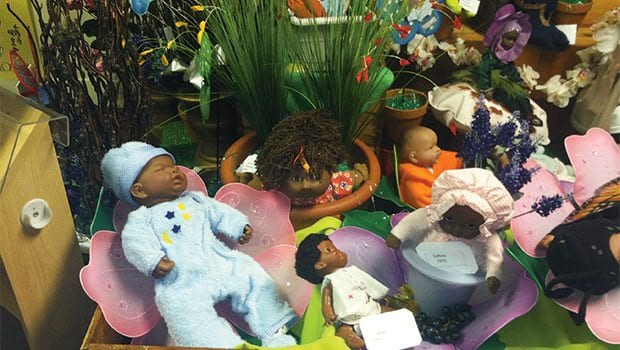
Debra Britt and her sisters are lifelong doll collectors. Their collection of historical black dolls was just a personal passion until Britt’s daughter came home from elementary school one day and said her teacher wouldn’t allow her to write a report on Madam C. J. Walker. According to the teacher, the African American entrepreneur, philanthropist and social activist was not important enough to cover. Britt and her daughter marched down to the school with a full project on Walker, and a group of dolls to back up the presentation. In that moment, the National Black Doll Museum of History and Culture was born.

Author: Courtesy National Black Doll Museum of History & CultureDoll of Whitney Houston.

Author: Courtesy National Black Doll Museum of History & CultureDolls of Patti Labelle
Britt’s education program, teaching black history through the lens of black dolls, spread like wildfire. The dolls became a narrative and physical resource with which to teach history. Britt gives the example of a Topsy-Turvy doll, a two-faced creation made by enslaved mothers with one black side and one white side. Britt says, “Dolls are an art form. They tell a story based on the materials they used, the fabric, the colors.”
In 2012 she secured a contract with the public school system to create and present educational programming. As the business continued to grow, she secured a physical space in Mansfield to store and sort through the dolls. That space, at 288 N. Main St., now serves as the Black Doll Museum, open to the public. The museum is a family owned and operated 501(c)(3) nonprofit and run as a volunteer effort. Donations are accepted through their website, www.nbdmhc.org, to keep the institution running.
Britt grew up on Harlem Street in Dorchester and lived there for 40 years. Her experiences with racism in schools sparked her desire not only to bring black history to school-aged children, but to serve as a resource for them. “It’s important to let black kids know that they can do anything,” she says. “They can’t quite see the future and it’s scary.”
In February, the museum will feature a black college exhibition titled “Endless Possibilities,” with dolls and stories of historically black colleges and The Divine Nine fraternities and sororities. It is also currently accepting submissions for a Martin Luther King Jr. student art show scheduled to exhibit at the museum in January. In addition, Britt hopes to create walking tours with the Black History Trail in Mansfield.
She reports that most of the museum’s visitors are from out of state and hopes that more Boston guests will visit in the new year. The museum is a four-minute walk from the Mansfield MBTA Commuter Rail station.






